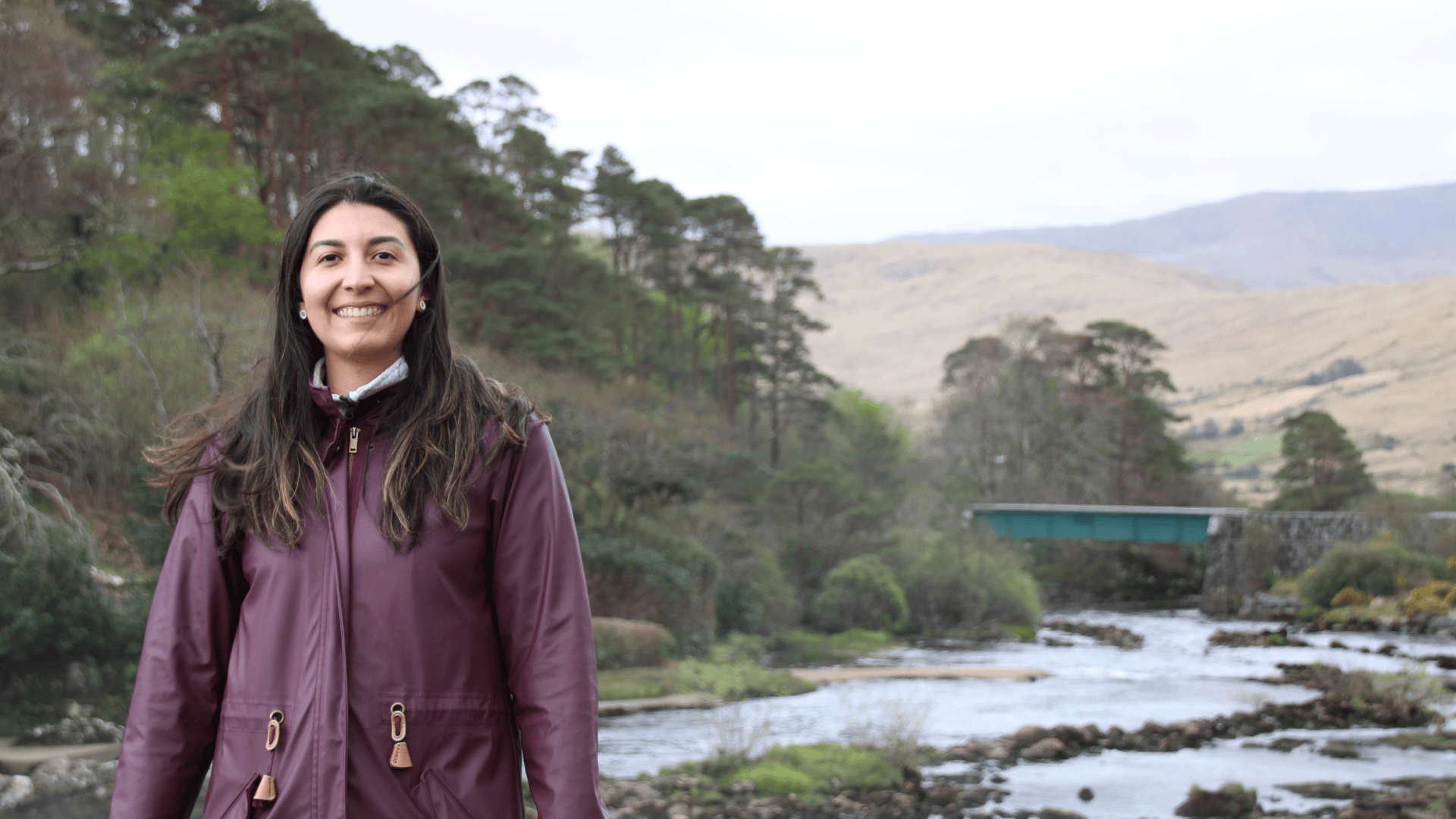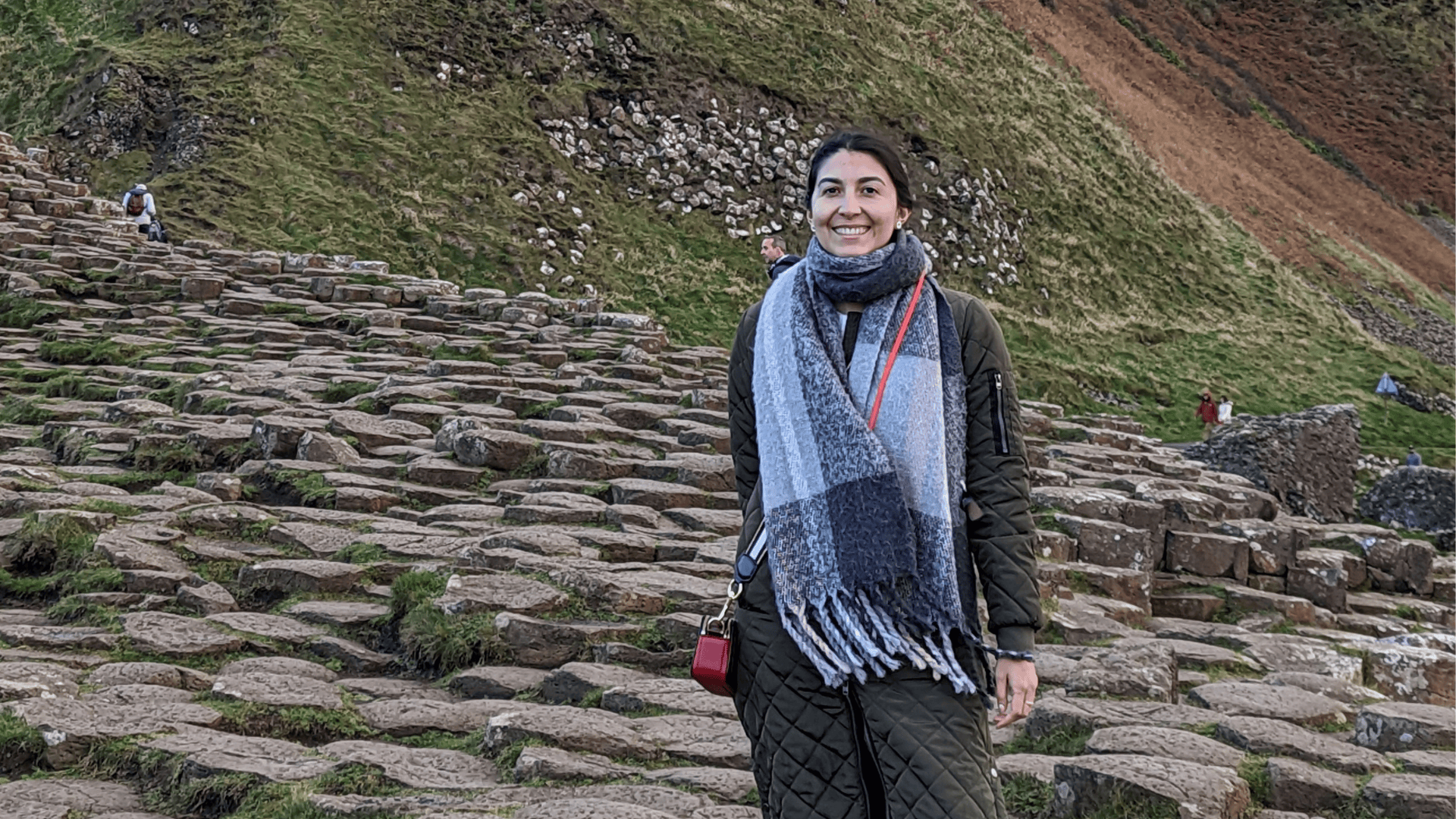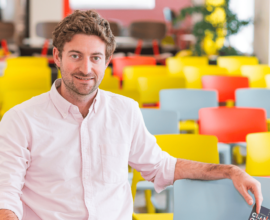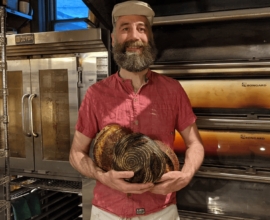Annie Rojas
The Colombian Amélie Poulain
![]() Reading Time: 9 minutes
Reading Time: 9 minutes
Assistant Vice President Citi
When she was growing up in Bogotá, Annie Rojas was fascinated by the night sky and its many wonders. As a teenager, she gave up on her long-time dream of becoming an astronaut and chose a career in finance. Pragmatic but ambitious, she figured that if international business wouldn’t send her to the moon, it could at least take her to the other side of the world.
Annie’s story could serve as an advertisement for international mobility. Moving to Nantes in 2011 to join the Audencia IMM programme, she learnt to speak French, made lifelong friends, and got her foot into Citi’s door where she is leading a successful career in supply chain finance.
Not everyone is tempted to move halfway across the globe and start life again in a foreign country with all the personal and emotional stresses this entails. But it certainly was a decision that paid off for Annie.
Let’s meet the international executive who tells us about her journey and why her granny-style trolley, her swimsuit and a healthy dose of adventurous spirit are some of its special features.
Did you grow up in a traditional or liberal family?
I was born and raised in a close-knit family in Bogotá, the capital of Colombia. My two younger brothers and I were inseparable. My father has a degree in business and worked for Volkswagen pretty much all his life; my mother is a psychologist. My parents have always been proud of their Colombian roots but they also wanted us to develop an open-minded attitude. They often referred to our family members who moved to the US as inspirational. They enrolled us in a bilingual school knowing that speaking English would open doors to their children.
What sort of child were you?
I was quite shy and did not hang out with the cool kids. My boyfriend insists that I’m still uncool (laugh)… but I am definitely more open these days. The experiences I had abroad that forced me to throw myself into the unknown have helped shake off the shyness. I still have a tendency to get nervous. I got nervous ahead of this interview actually! But it’s getting better with time.
I think I performed well at school I because my parents had paid for our private education and I felt I had to honour their investment. For some reason, they thought that no proper education would be complete without years of swimming lessons, so I clocked up more laps in the pool than I can count.
What were your dreams back then?
I was fascinated by outer space. I watched tons of space movies, and after a visit to the NASA centre in Florida I even wanted to become an astronaut. I gave up that dream when I was a teenager, but with hindsight, I realise that I still ended up choosing a path that led to far away adventures. This is how, at 16, I ended up on a bachelor programme in finance and international business at Bogotá University.
Living in France was another dream of mine. I loved the language and everything else I discovered about the culture through the many French movies I watched. I fantasised about becoming the “Colombian Amélie” and retracing her steps through the winding alleys of Montmartre. At uni, I met some exchange students from Audencia. I was impressed that they all had exciting international profiles already. They sold Audencia and the city of Nantes to me and I enrolled in Audencia’s international master in management (MSc IM) programme.
Was your experience of Audencia as life changing as you had anticipated?
It was! Until then, I had only left the country to visit my family in the US, so this was my first time in Europe. At 20, it was also my first solo trip and first steps away from my family. That was 10 years ago, and I have been living abroad ever since. Overcoming the language barrier was more challenging than I had predicted. I’d studied French for 4 years at university and thought I’d do OK until the day I found myself in the Nantes airport shuttle, praying I would find my way to the “Commerce” station… I stuck close to the driver until he promised me that I had made it to the right place. That was quite a stressful jump in at the deep end.
In a single year at Audencia, my classmates – many of whom I still count as close friends, and I built so many memories. We travelled to Barcelona to visit a partner school, and a few of us celebrated New Year in Switzerland. The opportunity to continue onto a yearlong internship was also immensely valuable. In Colombia, when young graduates leave university, they feel much more vulnerable without this prior work experience.
How easy was it adapting to French culture?
What really helped was living with a French family. We would have long dinners together and they introduced me to the local cuisine (ah! Le plateau de fromages!), and many other traditions. They moved house while I was there (and I went with them!), and they put up little signs with the family members’ names on the doors of each bedroom. I will never forget seeing mine was marked “La Chambre d’Annie”. They told me they kept the sign up a long time after I moved away, which I found so touching. To this day, I call them my “French mum and dad”.
The main cultural difference I had to adapt to was around friendship. For the first few months, when I engaged in a conversation I naturally expected the person to be my friend or at least be willing to build a friendship. Sometimes I would bump into people the following day and they would not remember me, a reaction which takes some getting used to! Then, when I started to experience the office culture, I understood that the French tend to keep their work and personal relationships separate. It gets better when you accept that and don’t take it personally. French people are more private than Colombians are and some need time to warm up to new acquaintances. On the plus side, once you have formed strong bonds with someone, they will treat you like family.

How did you climb the steps at Citi?
For me it’s always been about seizing opportunities as they present themselves. As the expiry date on my student visa got closer, I tried to remain philosophical about the dozens and dozens of internship applications and rejections. I set myself a deadline and decided that if I hadn’t secured an internship two weeks beforehand, I would pack up and go travelling. On the day I was getting ready to pack my suitcase, my luck turned and I received an offer from Citi.
In 2011, I joined one of the bank’s branches in Paris, close to the Champs Elysées for a one-year internship that was later converted into a permanent role. I started in the trade and treasury solutions department, and my job involved going through export documentation and finding financial solutions for exporting from France. After being promoted to trade sales associate, I got to work with a broader selection of products such as supply finances, letters of credit and guarantees. My clients were using our services to ensure that the risk associated with the transactions in terms of documentation and payment was covered for both parties. Suppliers and buyers relied on me to make their interactions easier. My job was client-oriented from the start, and my manager, a great mentor, encouraged me to learn on the job.
Did you go on an Amélie pilgrimage to Montmartre when you arrived in Paris?
You may laugh but this is exactly what I did on my very first day! When I lived in Paris, I spent so much time in this quaint neighbourhood. As I said, I love swimming as it has a sort of meditative effect on me, so another way I spent my free time was to try out as many swimming pools as I could find… and there are lots! I was on a sort of mission, or “swimming pool crawl” (laugh). My top pick is the Molitor; I love its avant-garde atmosphere.
Why did you decide to move to Dublin?
In 2014, employees with a bit of trade experience and language skills were encouraged to apply for a position that had opened there. It was a promotion and, with Dublin being on of Citi’s biggest European hubs, it would give me exposure. Frankly, after only three years in France, it had not crossed my mind to relocate, but the opportunity was too good to miss. I accepted the offer without having ever set a foot in Ireland. I didn’t know a soul there, and the only taste for the Irish life I had was through the fun and colourful tales of former Irish colleagues. I packed my suitcase and went!
What does your current role entail?
My remit grew when I took charge of all European clients and started to control a larger scope of products. I am now Assistant Vice President, or AVP, and I work with another area of trade, which is supply chain finance. I engage with my clients’ suppliers who want to participate in our programme. It helps them receive early payment and improve their cash flow. Recently I have also started managing our documentation team who helps with onboarding clients. It’s a team of 8, based in India, with a varied skillset. Some of them have been in supply finance for longer than I have and it has been a rewarding experience so far.
What makes it exciting to work in your sector?
It’s a dynamic sector with ever-changing legislation so trying to keep up makes it an exciting challenge. It suits people who get a kick out of working in a multicultural environment and across different time zones. It also feels good to know that my work leads to practical applications for end users as we enable the trade of thousands of everyday goods.
What are your predictions for the global supply chain?
Clients ask me this question a lot and it’s a tough one! I think that following the pandemic, trade will move from a crisis mode to a more normal mode of operating. 2022 was the year when we learnt some lessons from the chaos we faced, and we will accept that some processes will never return to the pre-pandemic times. Still, silver linings such as the possibility of working from home emerged in the aftermath of the pandemic.
What is the corporate culture like in Dublin? Do people still hit the pub at 5pm every day?
Not every day… but most days! In Paris, social interactions between colleagues amounted to the occasional “after work apéro en terrasse”. In Dublin, workers routinely finish their day in the pub. The camaraderie of the Irish workplace makes it easier to make friends and pubs help this, mixing people of all generations and backgrounds, finding it an easy way to share their life stories over a pint… or two.
What is it like being a Colombian in Dublin?
There aren’t many Colombians here. Until recently, we didn’t have access to an embassy, but only a consulate that we could reach once a year. The European media mainly tends to portray Colombia through the lens of its criminality issues and sadly, negative stereotypes still persist and can be exhausting to address. However, references that are more positive are now emerging. People’s curiosity about my country can be amusing: I was once asked if I was related to Gloria from the Modern Family sitcom (I’m not), or how I cope with the weather in Ireland, even though Bogotá is in the coldest and rainiest region of Colombia, so getting used to Dublin’s meteorological conditions hasn’t been at all hard. In any case, as the saying goes here: “the weather here might be cold, but the people are warm”. I have always felt truly welcome here.
Do you feel settled in Dublin now?
It’s interesting that I have never felt so Colombian since living abroad. After 8 years in Ireland, this is home. I applied for and obtained Irish citizenship as a way of showing my gratitude for the opportunities that the country has given me. I also wanted to be able to participate in society and exercise my right to vote. Ireland has held various referendums lately, where citizens have expressed their wish for change on important societal issues such as divorce and abortion. It was inspiring to feel that I could contribute. It’s funny how life plays out: Ireland wasn’t on my radar until a few years ago, and now here I am, a proud Irish citizen! I hold dual citizenship because I will never forget my Colombian roots.

Can we please go back to your boyfriend claiming you are “uncool”?!
Well, he claims that I’m like someone in her seventies (laugh). I admit that I listen to classical music, I bake, I go for walks, I do my grocery shopping with a trolley like a granny. But I have adopted many local traditions, and popping down the pub for a good time is top of my list, so I can’t be that uncool! (laugh).
Any plans for the weekend?
Big plans! Tomorrow I’ll be flying to Colombia with my fiancé for Christmas. I haven’t been in over two years, and I am beyond excited despite the 20-hour flight. Christmas in my country is such a special time. Celebrations start from the 1st December! I am looking forward to some serious wedding planning talks and to watching the Encanto movie… multiple times!
Meeting my soon to be husband here in Ireland has also played a big part in settling in. He is Danish and works in digital advertising. You could say that we represent the two sectors that Ireland is a renowned hub for: finance and tech. My dad is taking English lessons so that’s definitely a sign that he and my mother have come to terms with the fact that I’m not relocating to Colombia any time soon. I imagine that at some point we might move home – to Denmark or Colombia – unless we head to somewhere new that is neutral to both of us. I love the idea that our options are open.

